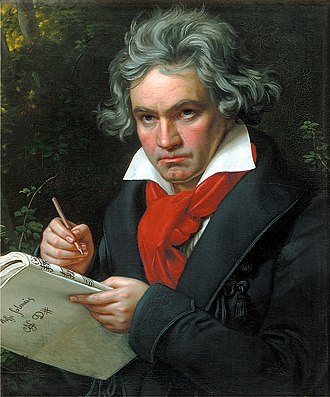- Ludwig van Beethoven, born on December 17, 1770, in Bonn, Germany, was a renowned composer and pianist of the Classical and Romantic eras.
- He is considered one of the most influential composers in Western music history, known for his innovative compositions and profound emotional expression.
- Beethoven began losing his hearing in his late twenties, but this did not deter him from creating some of his greatest works, including his symphonies and piano sonatas.
- He was known for his fiery and passionate temperament, which was reflected in the intensity and emotional depth of his compositions.
- Beethoven’s nine symphonies, particularly his Fifth and Ninth Symphonies, are regarded as masterpieces and have had a lasting impact on classical music.
- Despite his hearing loss, Beethoven continued to perform as a pianist, often giving public concerts to showcase his exceptional talent and virtuosity.
- He composed in a variety of musical forms, including symphonies, piano concertos, string quartets, and sonatas, pushing the boundaries of these genres with his innovative approaches.
- Beethoven’s Third Symphony, known as the “Eroica,” marked a turning point in the history of symphonic composition, expanding the form and scale of the symphony.
- He was known for his meticulous approach to composition, often revising and refining his works extensively before considering them complete.
- Beethoven’s music bridged the gap between the Classical and Romantic periods, influencing composers who followed, such as Brahms, Wagner, and Mahler.
- He was an accomplished pianist and improviser, often dazzling audiences with his ability to spontaneously create intricate musical passages.
- Beethoven’s famous piano composition, “Für Elise,” is one of the most recognizable and widely played classical pieces in the world.
- He had a complex and challenging personality, often struggling with personal relationships and battling feelings of loneliness and isolation.
- Beethoven’s opera, “Fidelio,” reflects his belief in the power of freedom and human dignity, addressing themes of political oppression and liberation.
- He composed a number of sacred works, including his monumental Missa Solemnis and his Mass in C major, showcasing his ability to create deeply spiritual and transcendent music.
- Beethoven’s Fifth Symphony is famous for its opening motif, consisting of three short notes followed by a long note, which has become one of the most recognizable melodies in classical music.
- He composed the “Moonlight Sonata” (Piano Sonata No. 14), a hauntingly beautiful piece that is often associated with feelings of melancholy and introspection.
- Beethoven’s Ninth Symphony is renowned for its inclusion of a chorus and vocal soloists in its final movement, setting Friedrich Schiller’s “Ode to Joy” to music.
- He composed music in a wide range of styles and moods, from dramatic and tumultuous to tender and lyrical, showcasing his versatility as a composer.
- Beethoven’s music often pushed the boundaries of traditional tonality and structure, introducing innovative harmonies and unconventional forms.
- He was known for his passionate dedication to his art, often working obsessively on his compositions and striving for perfection.
- Beethoven’s “Symphony No. 6,” also known as the “Pastoral Symphony,” vividly depicts scenes of nature and evokes a sense of tranquility and beauty.
- He had a profound influence on the development of the piano as an instrument, expanding its range and expressive possibilities through his compositions.
- Beethoven’s final complete symphony, the “Symphony No. 9,” is often regarded as one of the greatest achievements in Western music history.
- He wrote his only opera, “Fidelio,” during a time of political turmoil and upheaval in Europe, expressing his belief in the triumph of justice and freedom.
- Beethoven’s composition style evolved throughout his life, moving from the classical elegance of his early works to the intense emotional expressiveness of his later period.
- He had a significant impact on the concept of the “composer as artist,” shifting the focus from serving patrons to asserting artistic independence and individual expression.
- Beethoven’s Ninth Symphony, with its groundbreaking inclusion of voices in a symphony, marked a departure from traditional symphonic form and became a symbol of universal human aspiration.
- He was known for his improvisational skills as a performer, often captivating audiences with his ability to create intricate and spontaneous musical variations.
- Beethoven’s compositions often reflect his own personal struggles and challenges, serving as an outlet for his emotions and inner turmoil.
- He left behind a vast body of work, including 32 piano sonatas, 9 symphonies, 5 piano concertos, and numerous chamber and vocal music compositions.
- Beethoven’s string quartets, particularly the late quartets, are considered some of the most profound and introspective works in the genre.
- He was deeply inspired by the ideals of the Enlightenment, embracing concepts of liberty, equality, and fraternity in his music and personal beliefs.
- Beethoven’s deafness profoundly impacted his social and personal life, leading to a withdrawal from society and increased reliance on written communication.
- He had a close friendship with Goethe, the renowned German writer, and the two admired each other’s artistic talents and exchanged ideas.
- Beethoven’s compositions often reflect a sense of struggle and triumph, capturing the human spirit’s resilience in the face of adversity.
- He revolutionized the role of the conductor in symphonic performances, emphasizing the importance of interpretive skills and the conductor’s role as a mediator between composer and orchestra.
- Beethoven’s compositions influenced not only classical music but also later genres, such as Romantic-era symphonic works and even early 20th-century modernist compositions.
- He composed his famous “Ode to Joy” melody for the final movement of the Ninth Symphony, creating an uplifting and triumphant musical expression of joy and unity.
- Beethoven’s symphonies, in particular, expanded the scale and scope of orchestral music, pushing the boundaries of what was previously deemed possible in symphonic form.
- He often struggled with financial difficulties, relying on patronage and commissions to support himself throughout his career.
- Beethoven’s music continues to be widely performed and celebrated, resonating with audiences worldwide for its emotional depth and artistic brilliance.
- He wrote some of his most famous compositions during his “middle period,” characterized by a sense of struggle, defiance, and heroic triumph, such as the “Eroica” Symphony and the “Appassionata” Piano Sonata.
- Beethoven’s compositions were often autobiographical in nature, providing glimpses into his inner thoughts and emotional state at different stages of his life.
- He was a meticulous composer, often experimenting with different musical ideas and forms before settling on the final version of a piece.
- Beethoven’s music is known for its dramatic contrasts, alternating between moments of turbulence and serenity, sorrow and joy, reflecting the complexities of the human experience.
- He was a highly influential figure during his lifetime, inspiring a new generation of composers and setting the stage for the Romantic period of music.
- Beethoven’s “Symphony No. 7” is revered for its energetic and infectious rhythms, particularly the exuberant and joyful second movement.
- He continued to compose even as his hearing deteriorated, relying on his inner musical imagination to guide his compositions.
- Beethoven’s legacy as a composer and visionary continues to resonate, with his music enduring as a testament to the power of human creativity and the pursuit of artistic expression.
Facebook Comments


































